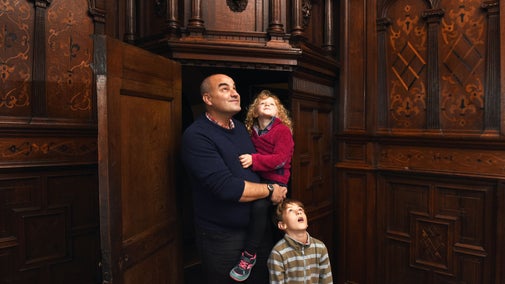
Discover more at Sizergh
Find out when Sizergh is open, how to get here, things to see and do and more

Complex and varied, the garden areas at Sizergh are interlinked and together tell the story of this family garden which has developed over 800 years. Explore the Rock Garden, Stumpery and Orchard: home to four national collections of hardy ferns, plus the Dutch Garden, Kitchen Garden and herbaceous border.
The garden will be really getting into its stride at this time of year, with fresh blooms and colour popping up everywhere.
Spot numerous varieties of Narcissi, with their white or pale outer petals and a shallow orange or yellow cup in the centre, in the Stumpery and along the Spring Walk. More of these cheerful blooms will carpet the Orchard and Wildflower bank. The pink, heavenly scented flowers of Daphne can also be seen on the Spring Walk.
Early flowering Japanese Apricot (Prunus mume Beni-chidori) can be found in the Rock Garden – this starts flowering in late February and the flowers are bright pink and almond scented. This is followed by the Magnolia in the South Garden in April, the Japanese cherry (Prunus shirote) at the entrance to the Stumpery with its fragrant white cup-shaped flowers, and the pale pink flowers of Prunus Kojo-no-mai on the Spring Walk.
Trained pears blossom on the Fruit Wall along with tulips on the Fountain Bed, along the Fruit Wall. In May, as you enter the Stumpery, you can’t miss the spectacular Hawthorn covered in white flowers. Later in the month the orchard will be filled with clouds of pink & white apple blossom.
The garden is managed with wildlife at its forefront; if you visit when we open in the morning, the Rock Garden is full of birdsong at this time of year, and newts will be waking up in the rock pools as the weather warms up.
Keep an eye out for frogspawn and tadpoles in the Mirror Lake in April and May.
Solitary bees buzz along the wildflower bank and the honeybees, which live in hives in the orchard, will be collecting nectar on warmer days. You might even spot a kingfisher on the Dipping Pond if you’re lucky.
We want to make sure that Sizergh is accessible for all. That's why we commissioned dedicated videos, in BSL, subtitled and audio described formats, to give you an idea of what your visit might look like. Below are the garden videos.
We ask for your permission before anything is loaded, as this content may introduce additional cookies. You may want to read the Google YouTube terms of service and privacy policy before accepting.
This virtual tour is accompanied by subtitles.
We ask for your permission before anything is loaded, as this content may introduce additional cookies. You may want to read the Google YouTube terms of service and privacy policy before accepting.
This virtual tour is accompanied by British Sign Language interpretation.
We ask for your permission before anything is loaded, as this content may introduce additional cookies. You may want to read the Google YouTube terms of service and privacy policy before accepting.
This virtual tour is accompanied by British Sign Language interpretation and subtitles.
We ask for your permission before anything is loaded, as this content may introduce additional cookies. You may want to read the Google YouTube terms of service and privacy policy before accepting.
This virtual tour is accompanied by audio description.
We ask for your permission before anything is loaded, as this content may introduce additional cookies. You may want to read the Google YouTube terms of service and privacy policy before accepting.
A virtual tour of SIzergh's garden.
From May - October, join a gardener on the first Wednesday of each month to take in the key areas of the garden, hear about what the gardeners have been up to, and discover what's planned for the month ahead.
The Rock Garden was created in the early 20th century and originally planted with acers, conifers and herbaceous perennials. Later on, the garden was further developed and more ferns added. In fact, the garden is home to four national collections of ferns, which can be found in the Stumpery, Rock Garden, Kitchen Garden and orchard.
We recommend viewing the Rock Garden from the bench under the Scots Pine with a cup of coffee. This ancient giant will keep you dry during a light shower or shaded from the sun on a hot day. The mature acers, with their delicately shaped leaves, are another highlight, with their magnificent purple foliage in spring and summer which turns to fiery red and orange in autumn.
The Stumpery opened in 2016 and every spring more than a dozen varieties of miniature daffodils complement the fresh green unfurling fronds of the ferns.
You'll find over 65 varieties of apple tree in the orchard, including many northern varieties - experience the cloud like blossom in spring, the carpet of wild meadow under the trees in summer, and ripe fruit in early autumn. Harvesting begins in August and continues until the end of October, and the harvest is used in the café or offered to visitors to take home in exchange for a small donation. Surplus fruit and vegetables are donated to Waste into Wellbeing, a local charity that provides meals for the community.
Many of the vegetables and flowers you see in the Kitchen Garden started life in the greenhouse; there’s always a variety of seedlings in there at any one time. The ethos of self-sufficiency has always been important to the Strickland family and continues to be so to this day. The combinations of vegetables and flowers are not only productive, but also beautiful, culminating in a colourful display. Just as the Stricklands would have grown fruit and vegetables to be used in their kitchen, today’s produce is supplied directly to the café on a daily basis.

There’s always something blooming in the 50m-long herbaceous border. The tennis court shelter is a quiet spot to look out over the border and lawn. It's on your left as you come through the Kitchen Garden and into the Rock Garden.
The Fruit Wall measures 60m and is built from limestone, faced with red brick to absorb the sun’s heat, which helps to ripen the fruit. The apsidal niche at the end of the wall is an ornate sheltered spot that gives great views of the Solar Tower – the oldest part of the house – and to the fells beyond.
The garden is home to lots of wildlife. Sunny embankments with wildflowers are the perfect habitat for bank voles and solitary bees, whilst shaded woodland areas are favourite spaces for hedgehogs. Pools and bog areas in the Rock Garden are alive with newts, frogs and toads, and small holes in walls and trees are the perfect place for black caps and pied flycatchers to nest. A dozen bird boxes are also positioned throughout the garden.
Open from April through to October, the Dutch garden is arguably the most peaceful part of the garden, and the ideal place for a meditative moment away from the crowds. The patches of long grass and flowers are home to a host of insects and butterflies and if you look up, you get a great view of the Solar Tower above you.
The summerhouse at the end of this area of the garden is a cosy sanctuary when it's wet and a great place for a quiet read - find a new book in the second-hand bookshop.
You can take a little memento of Sizergh home with you from the garden plant donation stall: vegetables and fruit are available when they're in season, along with bunches of sweet peas. All have been lovingly grown at Sizergh by the team of dedicated garden staff and volunteers.

We’re proud of the work we do towards improving access for all at Sizergh – last March, the Holeslack Accessible Trail launched. Now, we’re turning our attention to the garden, and plans to reopen an early 19th century access ramp, known as Cecilia’s ramp. Cecilia Strickland suffered from rheumatism, and had to make use of a very early model of a wheelchair. With small wheels attached to a simple armed chair, she referred to her aid as a ‘chariot’, and arranged to have a ramp built into the grounds to allow her to continue accessing the gardens. Following Cecilia’s death in 1814, the ramp became a flowerbed, and now our plan is to reinstate it. If you’d like to hear more about the project, or you’re interested in supporting it, please get in touch at sizergh@nationaltrust.org.uk, or contact Dan Taylor on 07789 744842.

Find out when Sizergh is open, how to get here, things to see and do and more

Can you discover eight of the birds that call Sizergh home? Take part in the Spring Bird Challenge.

Learn more about our plans to reopen an early 19th century access ramp, named after its original user Cecilia Strickland.

Connect with nature in Sizergh’s woodland, wetland and farmland. Find out about the wildlife you can spot while exploring this 1,600-acre estate.

Sizergh is a two pawprint rated place. Find out which areas of the estate you can explore with your dog.

Find out what to see in the House at Sizergh, including the Strickland family’s large collection of items spanning 26 generations and the renowned Elizabethan Inlaid Chamber.

Discover our gardeners’ top tips so you can make the most of your garden, plot or window box.

The Lakes is known for its dramatic, wild landscapes, but it's home to some intriguing gardens too. Explore castle grounds, a cottage garden that inspired Beatrix Potter, and more.